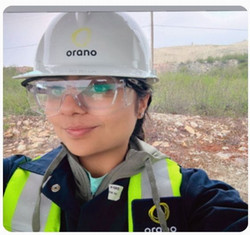Why Co-op?
The co-op program is an optional, accreditive academic workintegrated learning program connecting undergraduate students with quality engineering work experience. Our program adheres to the best practices in co-operative education as outlined by CEWIL Canada.
There are many benefits to participating in the Engineering Co-op Internship Program including:
- Career Boost: Develop a professional network, hone your engineering skills and can gain up to 20 months of paid engineering-focused work experience.
- Real-World Experience: Enhance your degree with full-time, paid work placements, gaining real-world experience and boosting your career prospects.
- Comprehensive Support: Receive guidance from co-op program staff, an industry mentor, and a workplace supervisor throughout your work term placement.
- Flexible Work Terms: Enjoy flexible internship options ranging from summer placements to 16-month terms, starting in January, May, or September.
Did You Know?
- On average, employers made offers to 41% of their co-op students and 39% of their interns for full-time work after graduation.
- On average, 42% of new grad hires have had previous work experience with their employer.
Program Overview
Work Term Options
The first opportunity to do a co-op work term is from May to August following the students second-year of study.
Subsequent work terms are permitted after they have completed at least one academic term of your third-year of studies. At this point, they may take on co-op work terms lasting 4-, 8-, 12-, or 16-months with start dates of January, May, or September.
Eligibility
To join the co-op program, students must:- Be enrolled in the College of Engineering and pursuing a Bachelor of Science in Engineering program
- Be in good academic standing as per the College of Engineering Academic Promotion and Standards Policy
- Have completed the first-year common core of engineering and have officially chosen a degree program area
- Have completed and passed the Introduction to Co-operative Education and Internship course
How to Join
Introduction to Co-operative Education and Internship course is a students gateway into the Co-op Program.
The Introduction to Co-operative Education and Internship course is available to undergraduate students within the College of Engineering who have completed their first-year common core and have officially chosen their degree program area. It is an online, asynchronous course offered in the fall and winter academic terms.
It is recommended that students take this course in their 2nd year of study so that they are prepared to take on a work term between their second and third year of studies.
Students who successfully complete 12-months or more of work experience through the co-op program, will graduate with "Co-op Internship" on their university transcript.
Once in the co-op program, students may take on a co-op work term if they:
- Maintain their good academic standing as per the College of Engineering Academic Promotion and Standards Policy
- Have completed at least two years of the Bachelor of Science in Engineering program at the time of first co-op work term
- Return to studies following their co-op work term with at least 12 credit units of coursework remaining towards the requirements of their Bachelor of Science in Engineering degree
- Are not registered in a capstone design course during the time of their co-op work term
- Complete their degree program, including the time they are on co-op work term(s), in the timeframe outlined in the Undergraduate Degree Completion Timeframe Policy
The Introduction to Engineering Co-operative Internship course to join the co-op program, is assessed as a category 7 tuition.
Students who secure co-op work terms are assessed tuition fees during those work terms. Fees are assessed in the appropriate internship course (ECIP 400-404) for each four-month work period.
Because of this registration, they are considered to be full-time students and are required to pay tuition and student fees for the sessions in which they are registered.
More information about tuition and fees can be found here.
It is important to note that student loans are usually able to be deferred during an internship placement. In addition, scholarships and bursaries can maintain their validity during a placement.
International students are eligible to participate in the program; however, they will require a Co-op Work Permit, issued through Immigration, Refugees and Citizenship Canada (IRCC), before beginning their work placement.
Important Notes:
- An Off-Campus Work Permit is not a sufficient permit for an internship placement. Students must obtain a Co-op Work Permit.
- In order to work in Canada, students will need to apply for a Social Insurance Number (SIN). If an international student did not receive a SIN at the port of entry, they must apply at Service Canada.
Testimonials
 |
- Vrinda A., Mechanical Engineering Co-op Student |
 |
"The Engineering CO-OP Program has provided me with an opportunity to succeed in my future career as an engineer. It is an experience that I will always look back on.'' - Grayson G., Past Civil Engineering Co-op Student |

